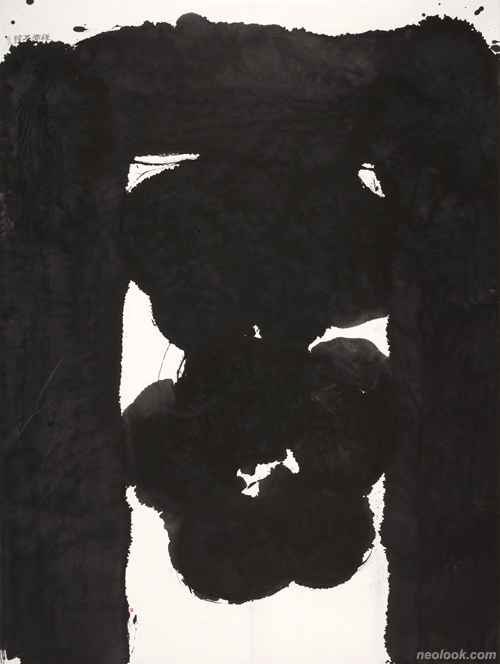- ● homepage
- ● archives
- ● restoration
- ● books
- ● big banners
- ● post board
- ■ neo's search
- ■ about us
- ■ 게재방법 안내
- 개인정보처리방침

- [email protected]
- Tel. 02_335_7922
- Fax. 02_335_7929
- 10:00am~04:30pm
- 월요일~금요일
- 3/3(월) 대체공휴일

HA, YOUNG-JUN'S SOLO EXHIBITION
하영준展 / HAYOUNGJUN / 河榮埈 / painting 2020_0610 ▶ 2020_0623
● 위 이미지를 클릭하면 네오룩 아카이브 Vol.20160413c | 하영준展으로 갑니다.
별도의 초대일시가 없습니다.
관람시간 / 10:00am~06:00pm
갤러리 H GALLERY H 서울 종로구 인사동9길 10 Tel. +82.(0)2.735.3367 blog.naver.com/gallh hongikgalleryh.modoo.at
'타고난 향기(天香)'를 듣다 ● 나의 작업방향은 한국의 선비정신과 현대회화의 조형성을 접목시켜 한국 현대문인화의 새로운 가능성을 모색하는 것이다. 여기서 선비정신은 작업과정에서 수묵정신과 문인정신으로 표현되어 조형으로 나타난다. 오늘은 내가 작업에서 드러내고자 하는 수묵정신과 문인정신을 '향기(香)'라는 단어로 비유해서 이야기 해 보고자 한다. ● 동양회화가 추구하는 '향기'란 형식을 초월한 운치(韻致)를 말한다. 동양의 예술가에게 감각할 수 있는 사물의 형태는 작업의 시작일 뿐이며 무궁한 예술 세계로 인도하는 '형식[文]'일 뿐, 그 지향점은 '내용[質]'과 어우러진 운치 있는 향기라 하겠다. 이 때문에 동양예술을 감상할 때는 그 안에 은은한 향기가 떠도는 것과 같은 오묘한 운치에 주의를 기울여야 한다. 동양의 고대 예술론에서는 이러한 사상을 '형상 너머의 형상(象外之象)', '맛 너머의 맛(味外之味)', '뜻 너머의 운치(意外之韻)'라고 표현하였다. ● 특히 문인화의 '향기'는 꽃의 향기가 아니라 작가 마음의 향기라 할 수 있다. 향기는 그릴 수 없는 것이지만 작가는 자신의 향기를 작품에 표현할 수 있어야만 운치를 얻을 수 있고, 그 작품 역시 감상자에게 향기와 여운(餘韻)을 줄 수 있다. 따라서 나의 작품에 드러나는 향기는 나의 영혼의 울림이라 하겠다. ● 동양예술은 인간 생명의 향기를 전달함을 최고의 가치로 여긴다. 예컨대, 시인 김경집의 시 『지금은 길을 잃었을지라도』 중에 '사람이 하늘처럼 맑아 보일 때가 있다. 그 때 나는 그 사람에게서 하늘 냄새를 맡는다'라는 구절의 내용과 유사하다. 이러한 하늘 냄새는 생명의 향기이고, 이 생명에 내재된 향기는 인간 생명 속에 본래부터 있는 '타고난 향기(天香)'이다. 흔히 동양 예술가들은 '향기를 듣는다(聽香)'라고 표현한다. 이때의 '듣는다'는 것은 밖으로 표출되는 소리를 듣는 것이 아니라 자기 생명 속의 향기로운 세계에 대한 탐색을 말한다. 따라서 내가 작품에서 추구하는 향기의 경계(境界)는 내가 좋아하는 대상의 향기가 아니라 나의 타고난 향기가 작품을 통해 사방으로 흘러넘치는 그런 경계이다.
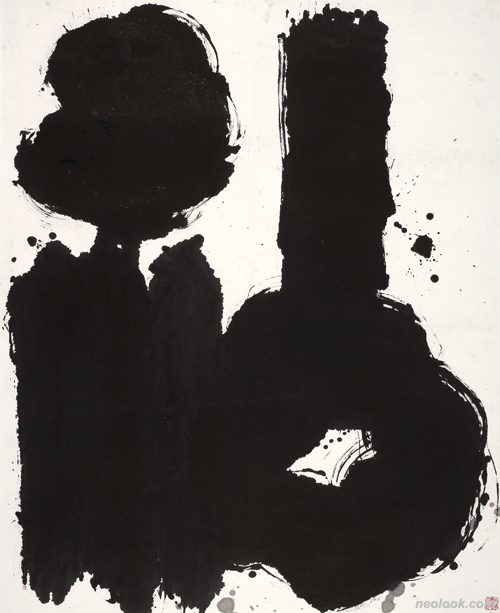
- 하영준_福-1_화선지에 수묵_157×128cm_2020
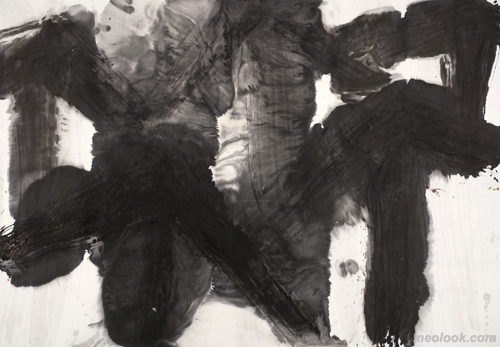
- 하영준_댓잎소리-1_화선지에 수묵_139×202cm_2020
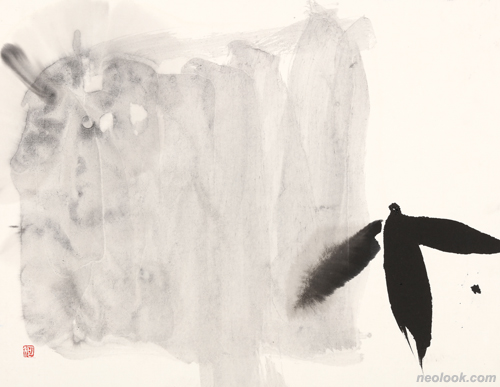
- 하영준_댓잎소리-2_화선지에 수묵_31.5×41.5cm_2020
그렇다면 나의 타고난 향기는 구체적으로 무엇인가? 우선, '한(恨)'을 들 수 있다. '한'은 모든 한국인의 정서 중 가장 밑바닥에 자리한다. 나에게 있어서 '한'은 내 인생의 슬픈 추억들과 타고난 나의 정서가 한 데 엉기어 만들어낸 눈물과 아쉬움, 그리고 그리움과 원망이 켜켜이 쌓여있는 보따리이다. 또한 그것은 이러한 슬픈 추억들을 그 누군가에 하소연하지 않고 그저 나 홀로 간직한 아픔이다. 이 '간직'은 참거나 삭이는 정도가 아니라 그 '한'이 소멸되는 것조차 바라지 않고 오히려 잊혀질까 두려워 그 아픈 추억들을 두고두고 곱씹는 것을 의미한다. 돌이키지 못할 슬픔을 돌돌 말아 놓은 채 마냥 어루만지는 것, 바로 '처절한 그리움'이다. 어쩌면 이러한 '한'은 나의 향기이자, 나를 지탱해주는 힘일지도 모르겠다. ● 다음으로 '적막하여 어찌할 수 없음'을 들 수 있다. 이것은 개인의 슬픔이 우주자연의 섭리와 연결되어 있는 경계라 할 수 있다. 예컨대, 인간의 유한한 생명과 달이 차고 기우는 그 끝없이 반복되는 자연의 영원성을 빗대어 울적해 하는 인생무상(人生無常)의 감정 같은 것이다. 이러한 감정은 어찌 할 수 없는 시간에 대한 서러움이기도 하다. 세월은 총총 흐르는데 인생은 짧기만 하니, 그 잡을 수 없는 시간이 못내 서러운 것이다. 특히나 자연계의 봄꽃과 가을 달은 그 무엇보다도 쉽게 인생무상의 아쉬움을 불러일으킨다. 또한 높은 산에 올라 먼발치를 내려다보면 언제나 그 자리 그 모습인 자연의 영원함에 비해 나의 인생은 너무나 짧고 보잘 것이 없는 것이다. 하지만 자연의 영원함에 비한 인생의 무상함에는 우주의 질서와 역사의 순리가 담겨 있기에 이러한 경계는 내가 어찌할 수 없는, 표현하기 어려운, 피할 수 없는, 말하자면 숙명적 슬픔이다. 또한 공손대랑(公孫大娘)의 검무(劍舞)와 같이 사람들은 늘 그녀의 춤추는 모습만 볼 뿐 적막한 영혼은 보지 못하는 것처럼 감상자들은 나의 작품 속에 표현된 대상의 형식만을 볼 뿐 나의 영혼은 보지 못하는 그런 경계라 할 수 있다. ● 뛰어난 예술은 언어로 표현할 수 없다고 하는데, 나는 이처럼 말로 표현하기 어려운 '처절한 그리움'과 '적막하여 어찌할 수 없는' 나의 향기를 작품에 표현하여 사방에 흘러넘치게 하고 싶다. 대상의 외적인 형태를 표현하는 것이 아니라 나 자신이 타고난 생명의 향기를 담담히 드러냄으로써 감상자들 개개인이 타고난 자신의 향기를 들을 수 있기를 희망한다. ● 오늘도 나는 적막의 경계에서 하늘의 향기를 듣는다. (2020. 4. 20. 오수헌(午睡軒)에서 하영준) ■ 하영준
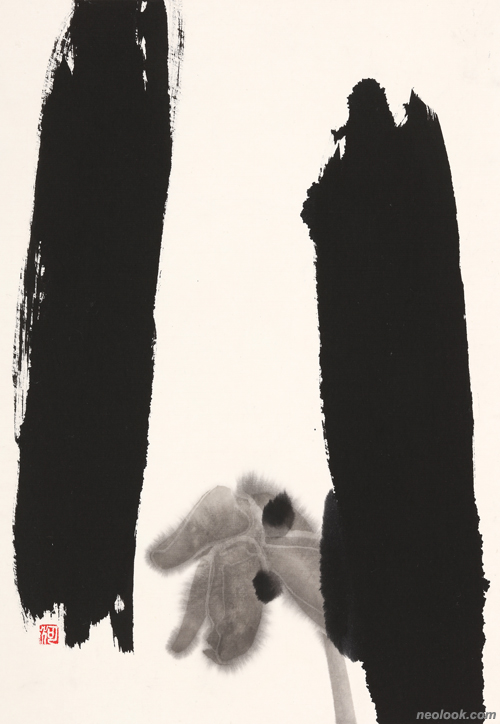
- 하영준_난초인상-2_화선지에 수묵_34.5×24cm_2020
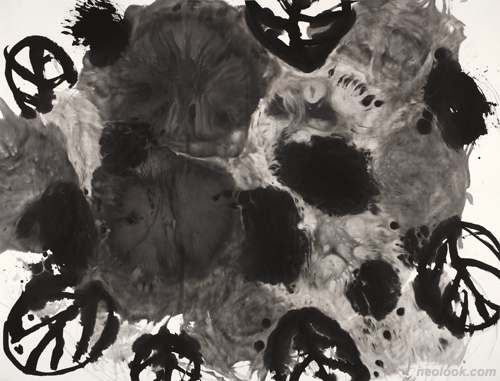
- 하영준_가시장미-1_화선지에 수묵_139×182cm_2020
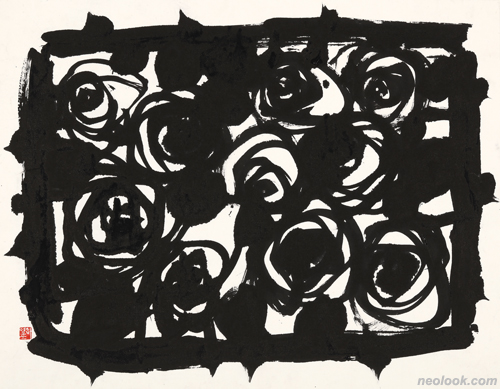
- 하영준_가시장미-2_화선지에 수묵_29×37.5cm_2020
Hearing an Inborn Fragrance ● My work explores new possibilities of contemporary Korean literati painting through the fusion of Korean seonbi (선비, virtuous scholars) spirit and contemporary painting's modeling quality. The seonbispirit is represented as ink-wash and literati spirit in my working process. The ink-wash and literati spirit I aim to reveal in my work is likened to the word "fragrance" here in this statement. ● The fragrance sought after by Oriental-style painting refers to a type of beauty and elegance that transcendsform. The form of an object sensed by an Eastern artist is nothing but the start of his art that leads to an infinite world. Its directing point is a scent that isin sync with content (quality).Due tothis, it is important topay attention to subtle elegance and beautyakin to a delicate, floating scent when appreciating a work of Eastern art. Ancient theory on art in the East described this idea as "form beyond form," "flavor beyond flavor," and "elegance and beauty beyond meaning." The scent of literati painting is not one of flowers; it isfrom an artist's mind. Although fragrance cannot be depicted, an artist can capture beauty and elegance and his work can bring fragrance and resonance to the appreciator if he is able to represent his own fragrance in his work. Thus,literati painters wouldput the scent of their minds in their art. I liken the scent brought about in my works tothe resonance of my soul. ● Eastern art regards the scent of human life and its conveyance as supreme value. This is akin to a verse from Even If I Get Lost Now, a poem by Kim Kyung-jip: "There is a time when a person seems as clear as the sky. I smell the scent of the sky in that moment." This scent of the sky is the scent of life, and a fragrance inherent in this life is "an inborn fragrance"that is originally innate in human life. Eastern artists have expressed it as "hearing a fragrance." "Hearing" here means unveiling the fragrant world of life, not hearing one'svoice. The periphery of the scent I try to revealinvolves revering the abundancy of my inborn fragrance through my works, not disclosing the scent of an object of my preference. ● With this in mind, what exactly is my inborn fragrance? One example is han(한), a concept for the form of grief or resentment which has often been described as a characteristic of Korean culture. Hanis anchored at the bottom of every Korean emotion. To me, hanis an accumulation of tears, regrets,longing, and resentment that is tangled up with sad memories from my life. Itis a sad memory or sorrow that is preserved withinme and does not appeal to anyone else. Such"preservation" does not entail suppressing or soothing such an emotion; instead, it means brooding over the sad memory in fear it willbe forgotten and hoping han will not die out. Tirelessly soothing irreversible sadness is simply due to "a desperate longing". Perhaps hanis my scent or strength that sustains me. ● Next is "an unavoidable state as it is too quiet". Each individual's sorrow is associated with the law of the universe and nature. This is like the feeling of transience or vanity in life. It arises when we compare human finitude to nature's infinitude in endless cycles and is a sadness of inevitable time. Time flies by fast but life is short. As a result, we feel remorseful about the time we cannot catch. Spring flowers and an autumn moon bring to mind the transience of life. When I look down from the top of a high mountain, I realize how my life is too short and insignificant while nature is everlasting and eternal. The order of the universe and the laws of history, however, are laden in the transience of life compared to the eternity of nature. Thus, this border is ineffable, unavoidable, and such a fatalistic sadness. ● "An unavoidable state as it is too quiet" is like when someone's dancing is the only thing visible whereas their calm soul is invisible, like in Gongsun Daniang's sword dance. Likewise, the border is a place where appreciators can view only the form of an object, not my soul. This "unavoidable state as it is too quiet" is my scent and the border I want to unmask in my work. ● It is often said that a great work of art is ineffable. I'd like to represent such "a desperate longing" and "an unavoidable state as it is too quiet" in my work in a way that allows them to overflow in all directions. This is not a representation of an object's external image but a revelation of the scent of life that is intrinsic to me. I hope each appreciator can smell their own individual fragrance through the scent of my work. ● Today as well I can hear my intrinsic fragrance on the border between silence and quietude. (April 20, 2020 Ha Young-jun at the office Osoohean) ■ Ha Young-jun
Vol.20200610c | 하영준展 / HAYOUNGJUN / 河榮埈 / painting

